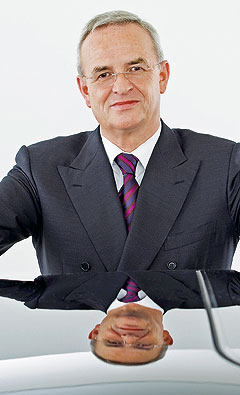Make / Model Search
News - VolkswagenVolkswagen eyes world ‘pole position’China syndrome: VW's New Bora is one of the company's hits in China where the brand's sales have risen 39 per cent this year. Chinese sales boom propels VW to within sight of its global leadership dream28 Oct 2010 VOLKSWAGEN Group vehicle sales surged 12.9 per cent in the first nine months of 2010 on the back of massive Chinese gains, prompting company CEO Martin Winterkorn to declare that “pole position” in the world automotive industry was firmly in VW’s sights. Europe’s biggest motor manufacturer plans to sell more than 10 million vehicles a year by 2018 – a figure that should see it overtake Toyota as the world’s number one. So far this year, VW has sold 5.4 million units, on target for 7.2 million sales this year – the same number of vehicles that Toyota sold worldwide in 2009. VW’s Chinese vehicle volumes have soared 39 per cent to 1.48 million units – twice as many vehicles as it sold in Germany where the overall market is down 23 per cent after the removal of scrappage sales incentives. VW’s profit from its Chinese joint ventures has almost tripled this year, to €1.3 billion ($A1.84b). Although that profit is not included in the group’s consolidated earnings – it stays in China with the joint venture – VW Group’s global operating profit still more than tripled from €1.5 billion ($A2.1b) for the first three quarters of 2009 to €4.8 billion ($A6.8b) this year. Half of that profit came from its prestige Audi division, which almost doubled its profit from €1.2 billion to €2.3 billion year on year.  Left: Volkswagen CEO Martin Winterkorn. Left: Volkswagen CEO Martin Winterkorn.Announcing the results, Mr Winterkorn said the company was well positioned to achieve the goals of its ‘Strategy 2018’ plan. “The Volkswagen Group continues to have our sights firmly set on capturing pole position in the automotive industry,” he said. “The foundations for our success are our presence in all key regions of the world, our focus on pioneering products and our drive to be the technology leader in all relevant areas. “This will allow us to systematically expand our multiple-brand group’s strong position in international markets.” VW was a pioneer in the Chinese market, forging a strong partnership with leading local car-maker SAIC Automobile, with whom General Motors also has a major joint venture. Audi alone has now sold more than one million cars in China in its 22 years on that market, with 200,000 Audis expected to find new homes there this year. VW is planning to add two factories in China, bringing the total to 11, as part of a €6 billion plan to expand production there to three million cars within four years. Another European manufacturer increasingly dependent on China is PSA Peugeot Citroen, whose Chinese sales were up 30.9 per cent in the third quarter in a market that rose 17.7 per cent year on year. Its market share with join venture partner Donfeng Motors improved to 3.4 per cent – well on its way to its goal of five per cent by 2015 – but well short of VW’s share of 18.3 per cent. In Europe, PSA held its own in a declining market, with Peugeot-Citroen registrations down 10 per cent in a market that declined by 11.4 per cent in Q3. Over the first nine months of 2010, however, PSA’s sales are up two per cent, raising its market share to 14.3 per cent. Worldwide sales for the first nine months came in at 2.6 million units – up 12.2 per cent. PSA consolidated revenues increased 10.3 per cent in the third quarter, with automotive revenues rising 2.3 per cent. PSA’s cross-town rival Renault also enjoyed increased sales volumes and revenues in the September quarter, with global vehicle deliveries jumping 5.7 per cent to 591,855, despite a four per cent decline in Europe. Revenue grew from €8.1 billion in the third quarter last year to €8.7 billion this year. Renault's gains were made outside of its Western European heartland, mainly in Latin America and Russia, where sales surged 41 per cent and 37 per cent respectively. Unlike PSA and VW, Renault has almost no market presence in China, where its alliance partner Nissan is leading the invasion. Another European motor manufacturer invisible in the world’s largest market – except for its top-shelf Ferarri brand – is Fiat Group, which nevertheless has reported an 11.9 per cent increase in sales revenues, to €13.5 billion in the third quarter over the same period last year. Net profit reached €190 million – a big improvement over last year’s Q3 profit of €25 million. The Italian company’s automobile revenues came in at €6.6 billion – about the same as last year – although Fiat vehicle sales were down 10.7 per cent, to 481,300, reflecting its heavy dependence on Europe. Its Ferrari brand, however, continues to fly high through the doom and gloom, delivering 1398 supercars in the quarter – up 3.9 per cent – but almost all of the growth has come from outside Europe, especially China where sales were up 15 per cent. Ferarri revenue grew 12.6 per cent to €446 million, delivering a €76 million profit (up 24 per cent). Year to date, Ferrari’s profit is sitting at €192 million, and may end up at record levels. Next year, Ferrari is set to enter the fast-growing and potentially lucrative Indian market as part of a five-year plan to almost double revenue by 2014.  Read more |
Click to shareVolkswagen articlesResearch Volkswagen Motor industry news |











Facebook Twitter Instagram